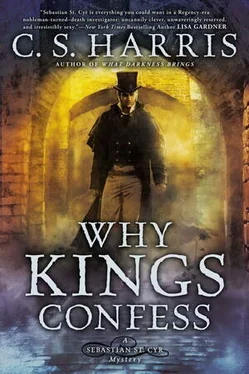C. Harris - Why Kings Confess
Здесь есть возможность читать онлайн «C. Harris - Why Kings Confess» весь текст электронной книги совершенно бесплатно (целиком полную версию без сокращений). В некоторых случаях можно слушать аудио, скачать через торрент в формате fb2 и присутствует краткое содержание. Год выпуска: 2014, Издательство: Penguin Group US, Жанр: Исторический детектив, на английском языке. Описание произведения, (предисловие) а так же отзывы посетителей доступны на портале библиотеки ЛибКат.
- Название:Why Kings Confess
- Автор:
- Издательство:Penguin Group US
- Жанр:
- Год:2014
- ISBN:нет данных
- Рейтинг книги:5 / 5. Голосов: 1
-
Избранное:Добавить в избранное
- Отзывы:
-
Ваша оценка:
- 100
- 1
- 2
- 3
- 4
- 5
Why Kings Confess: краткое содержание, описание и аннотация
Предлагаем к чтению аннотацию, описание, краткое содержание или предисловие (зависит от того, что написал сам автор книги «Why Kings Confess»). Если вы не нашли необходимую информацию о книге — напишите в комментариях, мы постараемся отыскать её.
Why Kings Confess — читать онлайн бесплатно полную книгу (весь текст) целиком
Ниже представлен текст книги, разбитый по страницам. Система сохранения места последней прочитанной страницы, позволяет с удобством читать онлайн бесплатно книгу «Why Kings Confess», без необходимости каждый раз заново искать на чём Вы остановились. Поставьте закладку, и сможете в любой момент перейти на страницу, на которой закончили чтение.
Интервал:
Закладка:
Crude new windows had been punched through the venerable old stone walls, while tattered laundry hung out to dry on the roof flapped in the cold wind. What was once a grand sweep of turf had been torn up here and there and planted with vegetables; the bleat of goats and the cluck-clucking of chickens filled the air.
“Looks worse’n a bleedin’ back court in St. Giles,” said Tom, scrambling forward to take the reins.
“Not exactly Versailles, is it?”
Tom scrunched up his sharp-boned face in puzzlement. “Ver-what?”
“Versailles. It’s the grand palace that was home to the kings of France until the revolutionaries dragged the royal family into Paris in 1789.”
“Oh.” The tiger didn’t look impressed. But then, Tom had no use for foreigners in general and the French in particular.
Sebastian dropped lightly to the ground. “Do keep your ears open around the stables, will you?”
Tom broke into a gap-toothed grin. “Of course, gov’nor!”
Still smiling faintly to himself, Sebastian turned toward the manor’s small, somewhat shabby portico. Virtually anyone else driving out from London uninvited to see the daughter of the last crowned King of France would most likely have been curtly rebuffed. But not Sebastian St. Cyr, heir to the powerful Earl of Hendon, Chancellor of the Exchequer. The estrangement between the Earl and his heir might be well-known, but few understood its reasons, and no impoverished European royal was going to risk alienating the member of the cabinet responsible for all economic and financial matters.
As a result, Sebastian waited in the dingy vestibule for only a few minutes before a powdered footman in threadbare livery appeared to escort him back outside and around the far wing of the house to where Marie-Therese Charlotte, Daughter of France, waited to receive him at the entrance to a long topiary arcade that stretched toward a silver shimmer of water in the distance. She had been standing with one of her ladies, her gaze on the canal. But at his approach she turned and nodded her dismissal of the footman.
Sebastian had met her before, at various London balls and dinners. On those occasions she had always been every inch the King’s daughter, dressed in velvets and silks and dripping the diamonds and pearls that her mother, Marie Antoinette, had managed to smuggle out of France with friends in the early days of the Revolution. Today she wore a somewhat shabby gown of dark green wool, made high at the neck with only a modest touch of lace at the collar and cuffs; an unfashionable, heavy wool shawl draped her shoulders. But her carriage was eminently regal, her head held high as she moved to greet him.
“Lord Devlin,” she said, her voice oddly high-pitched and scratchy and still noticeably inflected by her native Parisian accent. “How kind of you to call.”
He bowed low over the hand she offered. “Thank you for agreeing to see me on such short notice.”
She inclined her head but did not smile. He had heard that she never smiled.
Although she was still known in the popular imagination as “the Orphan in the Temple,” those days were long in the past. She was thirty-four years old. As a child, she had been blond and blue-eyed, but her hair had long since darkened to a dull brown. She had a tall, sloping forehead, a long nose, protuberant, red-rimmed eyes, and a somewhat receding chin. There was little of her mother’s famous beauty or vivacity about her, although Marie Antoinette’s disastrous haughtiness was very much in evidence.
Turning, she indicated the woman who had until then remained quietly in the background. “This is my dear companion, Lady Giselle Edmondson.”
Lady Giselle was of much the same age as the Princess, but both taller and more delicately built, with hair of the palest blond and an almost elfin face. The daughter of an English earl and his French wife, she had been born in Paris to an idyllic childhood of soft eiderdowns, lavender-scented gardens, and rose-tinged sunrises over the Seine. A devotee of the Enlightenment, the Earl had greeted the first stirrings of revolution with an enthusiasm bordering on delirium. The storming of the Bastille troubled him, but he’d scornfully refused to join the panicked stampede of his fellow aristocrats for the Channel. By the time the gutters flowed with blood and matted blond hair streamed from the heads of noblewomen carried on pikes through the streets, it was too late.
Gathering his young family, he tried to flee on a dark, windswept night. But they made it less than thirty miles before a howling mob surrounded their carriage. As thirteen-year-old Giselle watched with the faces of her younger brother and sister pressed tight against her skirts, the Earl and his wife were dragged from their carriage and torn limb from limb. Then the jeering, red-capped men and snarling women wrenched the children from her arms.
“We’ll raise them as good sansculottes,” they told her.
Sebastian had heard she spent the next three years searching for her little brother and sister. But she never found them. By the time she finally left France in the train of the newly freed Marie-Therese, she was just sixteen.
She had never married. But somehow she’d managed to come to terms with the horrors of her past and achieve an enviable measure of serenity. Unlike Marie-Therese, she did not clutch her sorrows to her or wear her sufferings as a badge of honor.
“We have met,” she told Sebastian now with a warmth that was utterly lacking in the Princess, “but only once and very briefly, so I doubt you would remember it.”
“The Duchess of Claiborne’s ball, last June,” he said, returning her smile.
She gave a startled peal of laughter. “Good heavens. How can you possibly recall it?”
He remembered because he’d found her life story so hauntingly tragic, and the degree to which she’d managed to overcome its worst effects inspiring. But all he said was, “Reports of my lamentable memory are greatly exaggerated.”
She started to laugh again, then cast an almost apologetic glance toward the Princess and raised a hand to her lips, as if hiding her smile.
“Let us walk,” said the Princess, turning their steps toward the canal in the distance. “Tell me, my lord: How does your wife?”
Sebastian was aware of Lady Giselle falling in several steps behind them. “She is well, thank you,” he said.
“I hear she is with child. Congratulations.”
“Thank you.”
“And married such a short time! Your wife is fortunate indeed.” Her hand fluttered to touch, ever so briefly, her own flat stomach, an unconscious movement that was there and then gone. She had been married something like thirteen years, yet had never conceived. He’d heard it said she remained convinced that God would some day send her a child, a child who would continue the Bourbon line. But time was running out, both for Marie-Therese and for her dynasty.
She said, “You do realize that I know why you are here.”
“Do you?”
“You have made the investigation of murder your special interest, have you not? And a Frenchman named Pelletan was murdered on the streets of London two nights ago.”
“You were acquainted with Dr. Damion Pelletan?”
“You are obviously aware of the fact that I was. Otherwise, why are you here?”
When Sebastian remained silent, she said, “He was a physician of some renown in Paris, you know.”
“No, I didn’t know.”
She kept her gaze fixed straight ahead. “I thought it might be worth my while to consult with him.”
“Somehow, I had the impression Dr. Pelletan was not a royalist.”
He watched her mouth tighten. “No,” she said. “He was not. But he was nevertheless an excellent physician.”
Читать дальшеИнтервал:
Закладка:
Похожие книги на «Why Kings Confess»
Представляем Вашему вниманию похожие книги на «Why Kings Confess» списком для выбора. Мы отобрали схожую по названию и смыслу литературу в надежде предоставить читателям больше вариантов отыскать новые, интересные, ещё непрочитанные произведения.
Обсуждение, отзывы о книге «Why Kings Confess» и просто собственные мнения читателей. Оставьте ваши комментарии, напишите, что Вы думаете о произведении, его смысле или главных героях. Укажите что конкретно понравилось, а что нет, и почему Вы так считаете.












